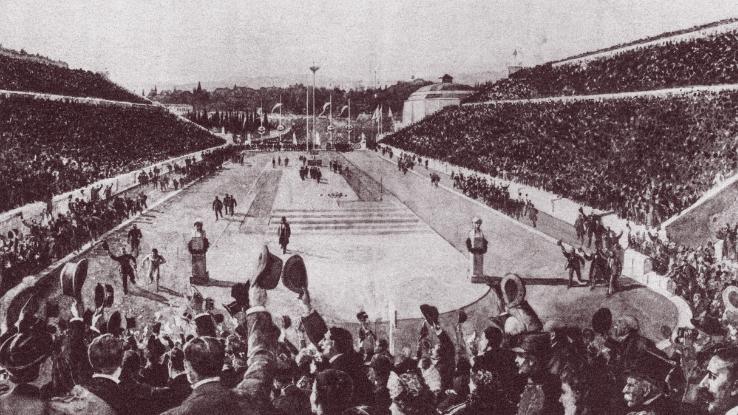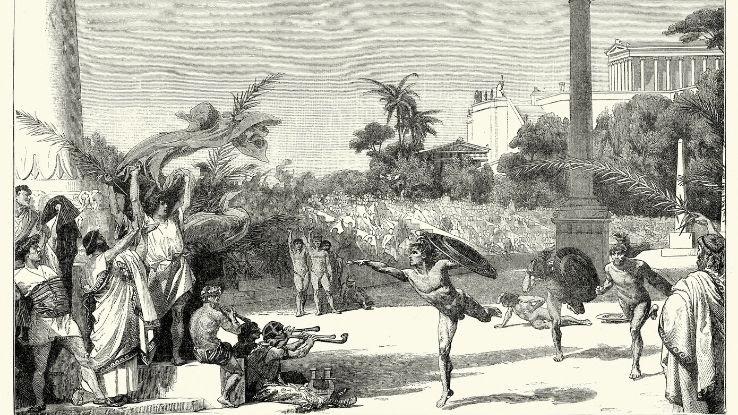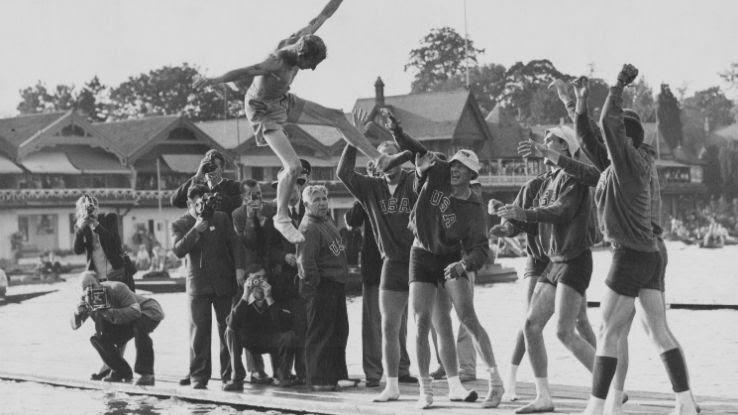Origins Forced Me to Download Games Again

The precise origins of the very first Olympic Games are hard to pinpoint. Experts know that the start Olympics were held in the Greek city of Olympia (hence the proper noun), sometime in 776 B.C. The Ancient Greeks hosted this event as a fashion to gloat the Gods and Goddesses of Mount Olympus. This is the leading reason why Roman Emperor Theodosius I, a devout follower of Christianity, banned the Olympics in 393 Advertising.
For more than 1,500 years, the Olympic Games were taboo. Then, on April half dozen, 1896, they made a comeback in Athens, Greece; athletes from 13 nations competed in various sporting events while sixty,000 spectators cheered them on. Information technology's hard to imagine the world without the Olympics now, but the story behind its origins may give a deeper appreciation for the Games.
The Ancient Olympic Games
The outset recorded Olympic Games took place in the aboriginal Greek sanctuary of Olympia in 776 B.C. Although Greece had many different sporting festivals at the time, the Olympic Games were the about pop.

No ane seems to know how the Games officially began. According to one fable, they were started past Heracles (dubbed "Heracles" by the Romans), who held the Games to honor his father, the god Zeus. Another theory suggests that the Games were held to commemorate Zeus' defeat of his own father, the Titan Cronus. And all the same another origin story suggests that the Games were tied to the Firm of Atreus and commemorated the time "Pelops won the paw of his helpmate, Hippodamia, by competing in a chariot race confronting her father, King Oinomaos (Oenomaus) of Pisa."
The very showtime Olympics focused on one unmarried event: racing. After a few years, the number of events increased, as did the number of days included in the festival. Over fourth dimension, sometime-school Olympic Games included horse races, battle and pankration, a sort of erstwhile-school MMA fighting event that had very niggling in the mode of rules.
Similar other festivals, the Games included creature sacrifices and altars. And, on the final day of the festival, folks historic and devoted themselves to Zeus. This specific element of the Olympics would crusade friction in the years to come.
When Rome conquered Greece in the 2d century A.D., everything changed. The Games continued for a little while, but the Romans never participated. However, the Games remained a very popular outcome, regardless of the sacrifices to Zeus. Simply, in 393 A.D., Emperor Theodosius I officially banned the Games, noting that the pagan celebration didn't align with his Christian values.

Fast-forward a few centuries. Throughout Europe, and much of the Western world, artists, historians and the general public continued to find ancient Greek civilisation and customs fascinating. In fact, many of these fans created their own festivals to emulate the Olympics. Finally, in 1894, the idea of resurrecting the Games was proposed more formally by Pierre de Coubertin, a French baron, at an international sporting conference. All 79 delegates who listened to the pitch agreed to revive the Games, forming the International Olympic Committee (IOC).
The commencement Summertime Games took identify from April 6–fifteen, 1896, in Athens, Greece. The first gold medal awarded at the mod Olympics was won past a Greek h2o carrier, Spyridon Louis, who successfully completed a 25-mile marathon. In true fandom mode, organizers honored the sporting result'southward namesake: The marathon road traced the path Pheidippides (or Philippides) ran to evangelize the news of the Athenian victory over the Persian army at the Battle of Marathon dorsum in 490 B.C.
Four years later, the Games expanded to include women athletes for the beginning time. And, by 1924, the Olympics had get a real global sensation. In fact, that was the aforementioned year the IOC introduced the Winter Games, allowing athletes of even more than sports to go for the gold.
Since 1896, the Summertime Games accept only been disrupted three times — all due to ongoing wars. That is, the 1916 Summertime Olympics were canceled due to World War I, and, in 1940 and 1944, the Games that were to be held in Tokyo and London, respectively, were both canceled due to Globe War II.
As a longstanding symbol of international cooperation and unity, the Games have the opportunity to bring competitors and spectators together – even in the wake of global disasters and cultural differences.
Source: https://www.reference.com/history/history-of-olympic-games?utm_content=params%3Ao%3D740005%26ad%3DdirN%26qo%3DserpIndex
0 Response to "Origins Forced Me to Download Games Again"
Post a Comment